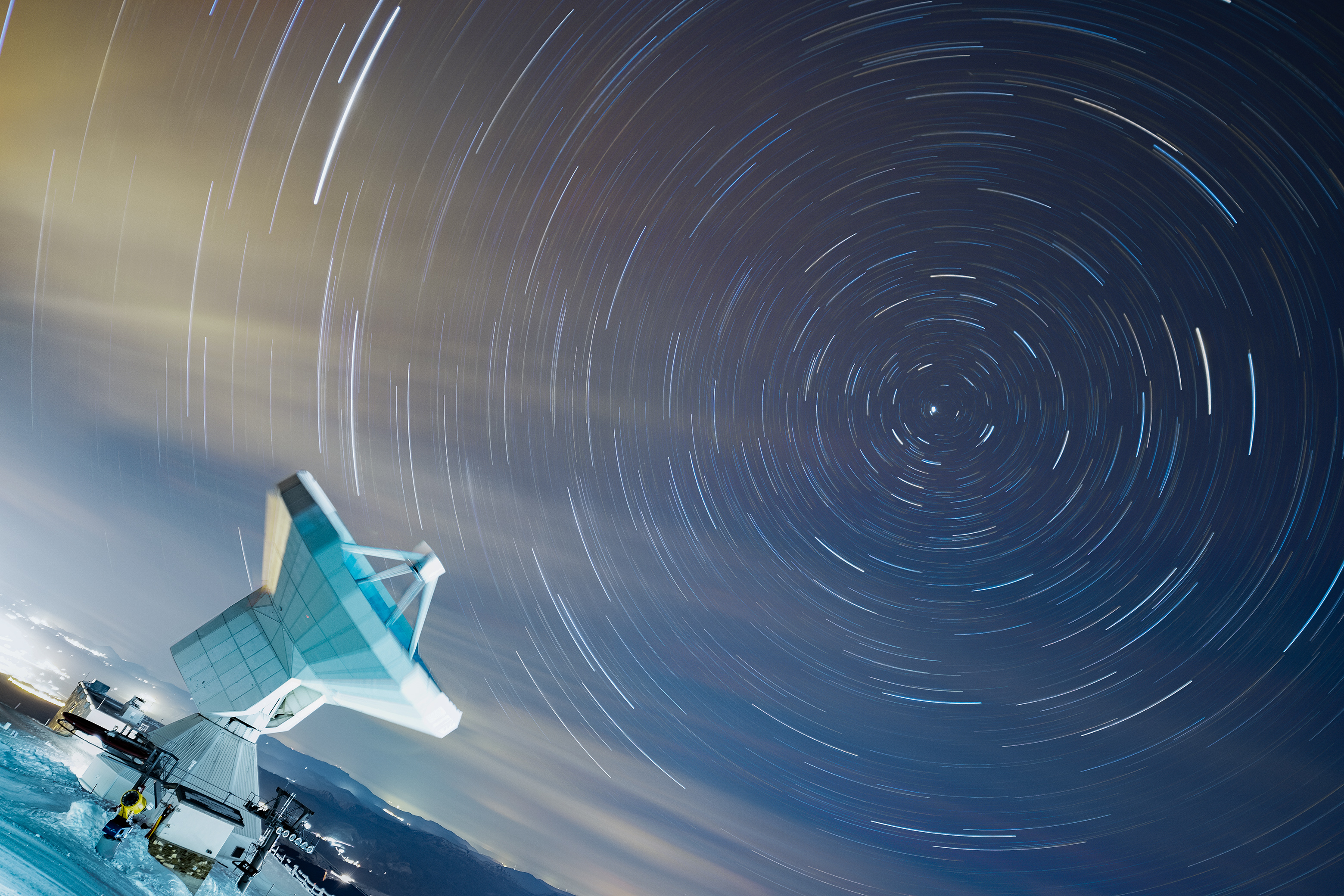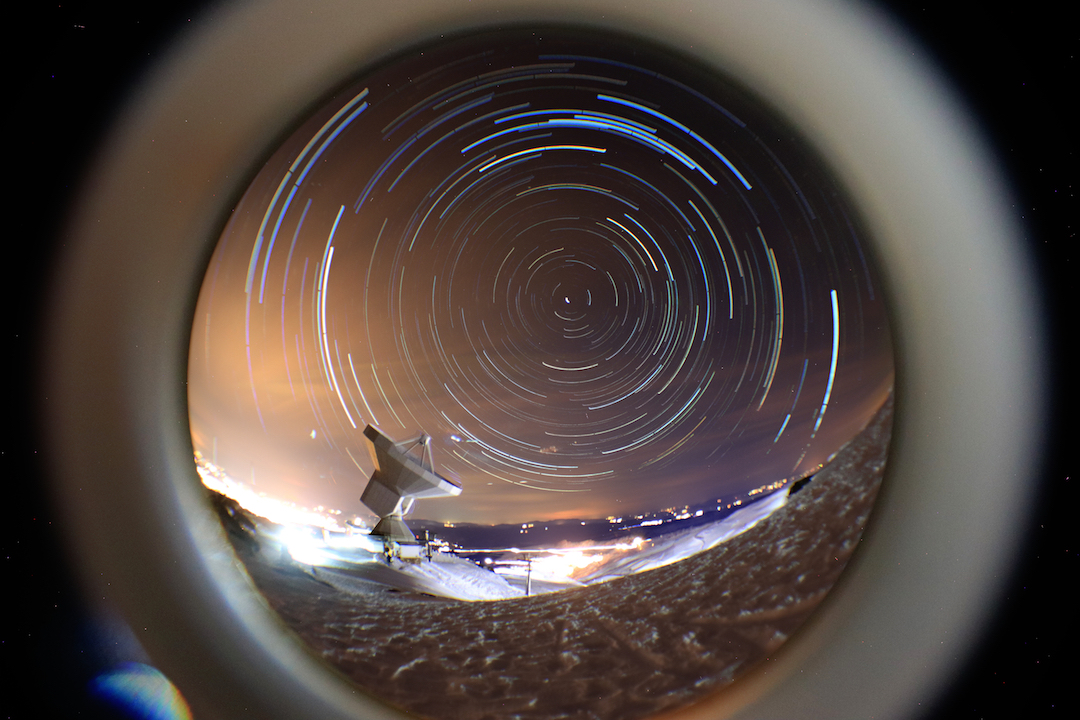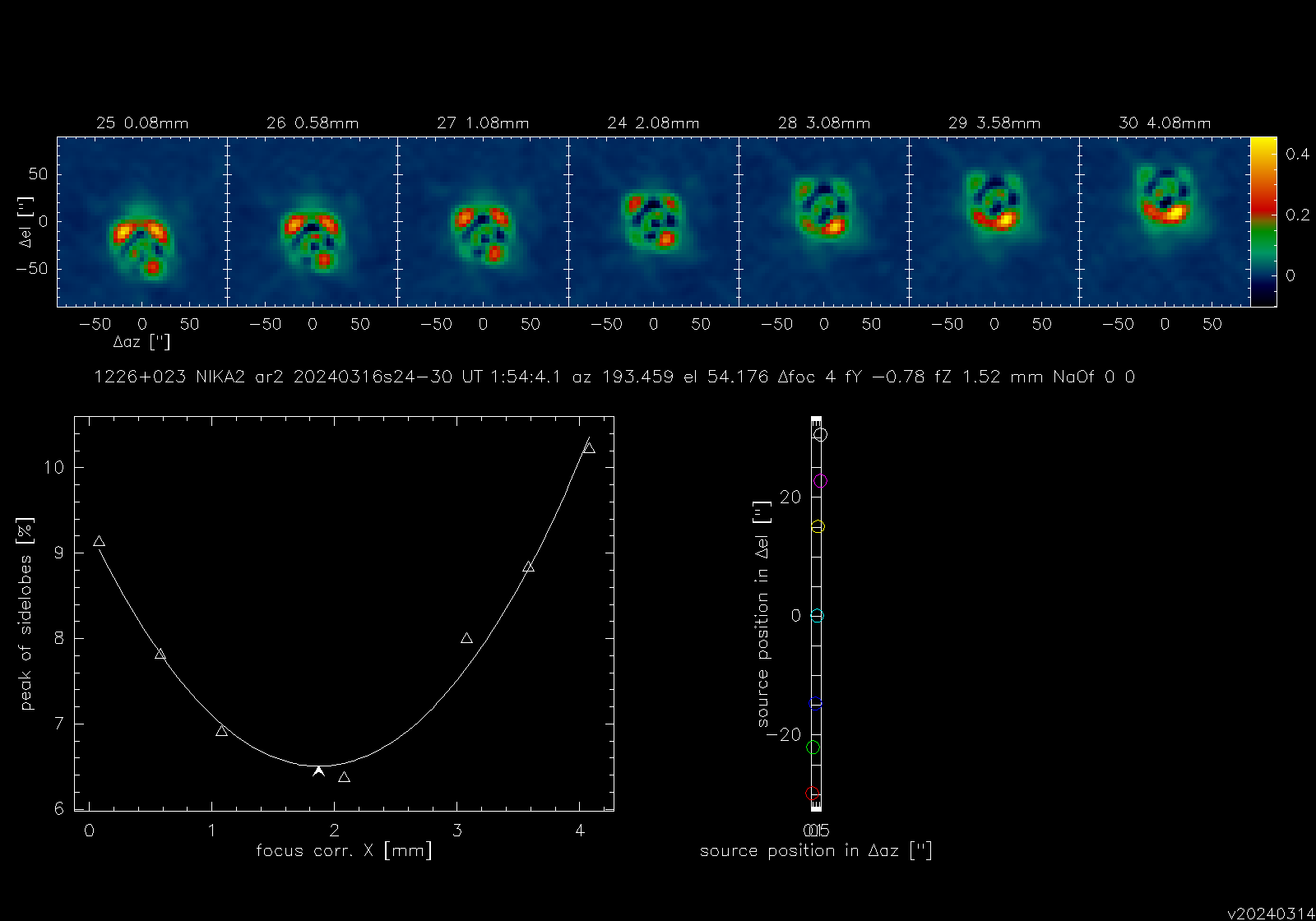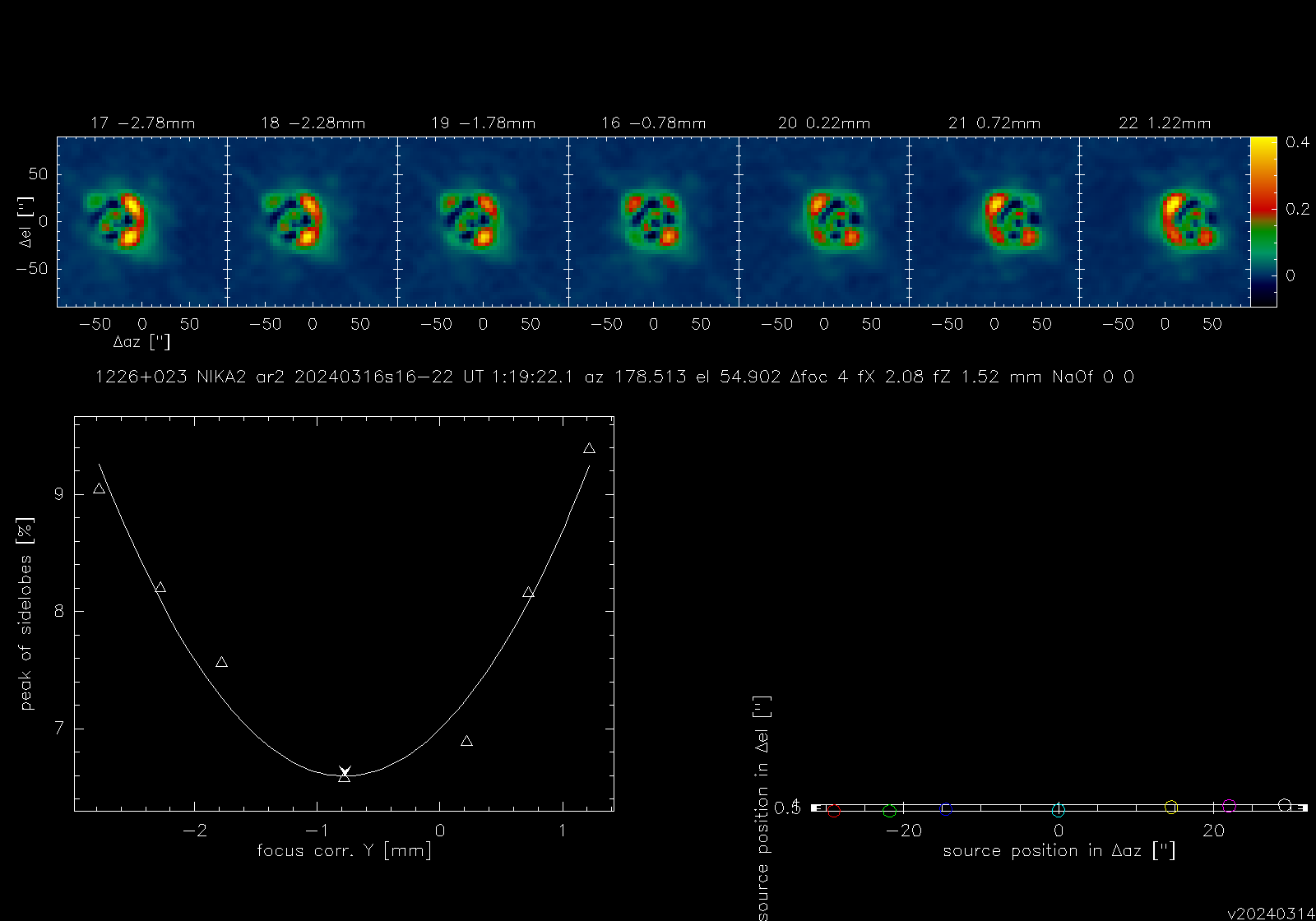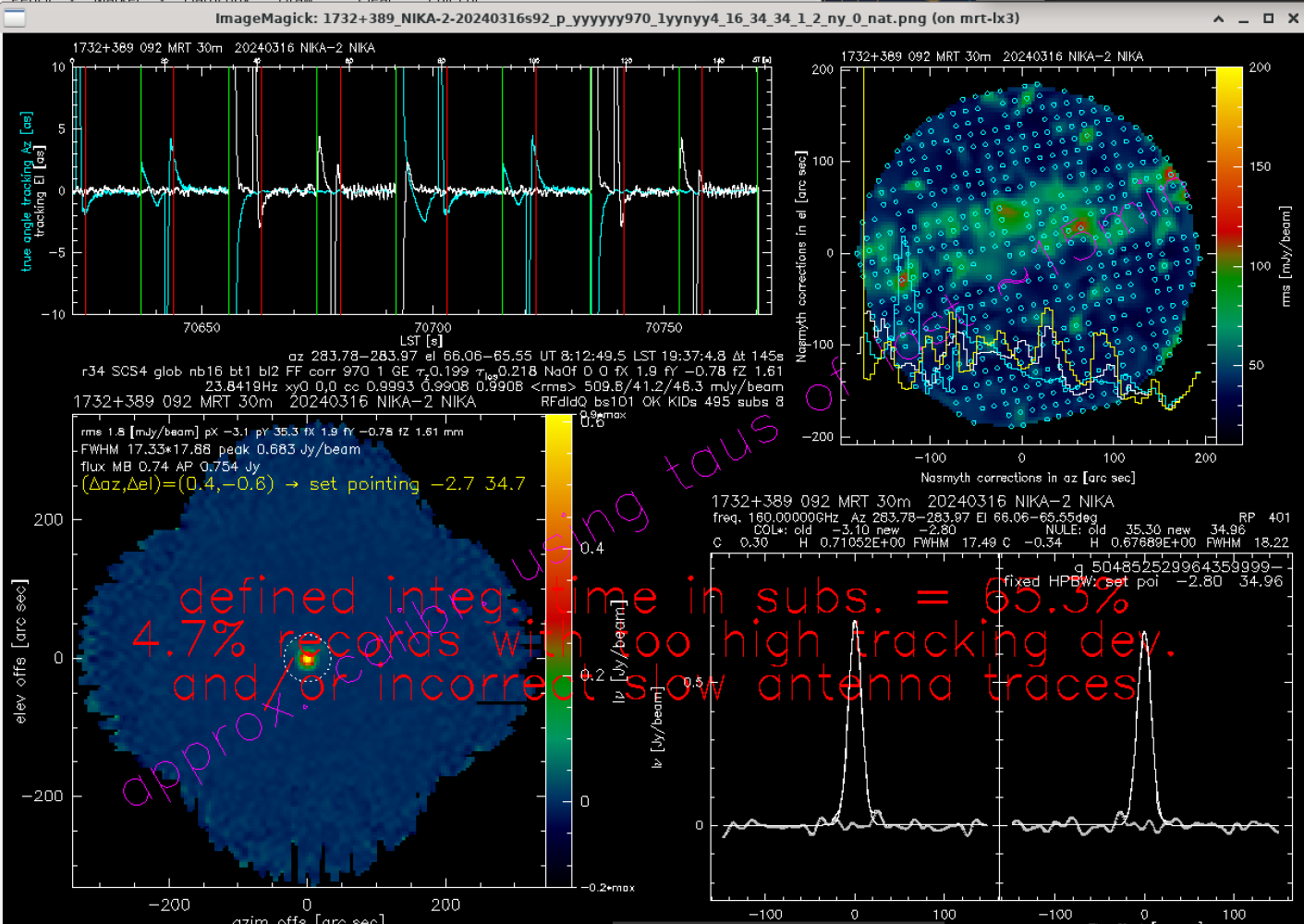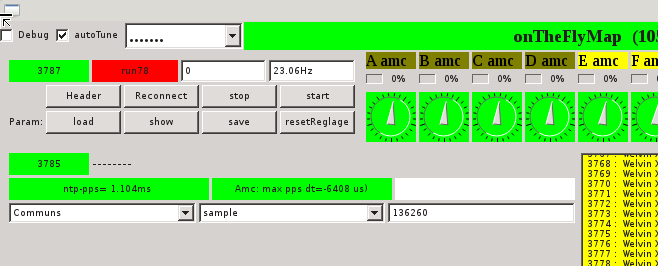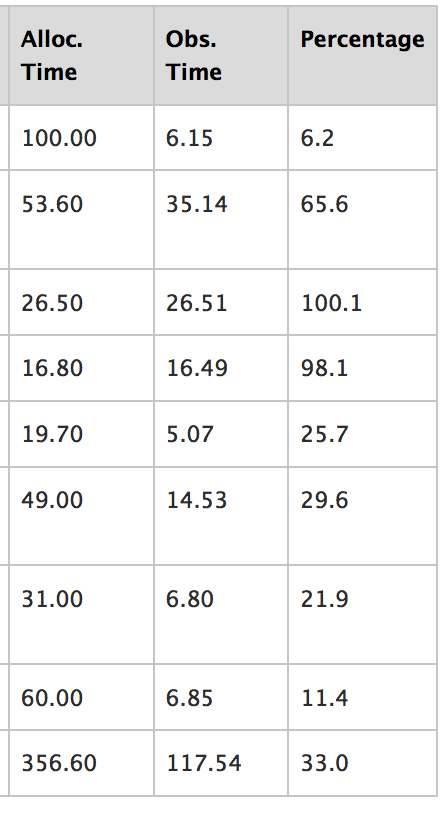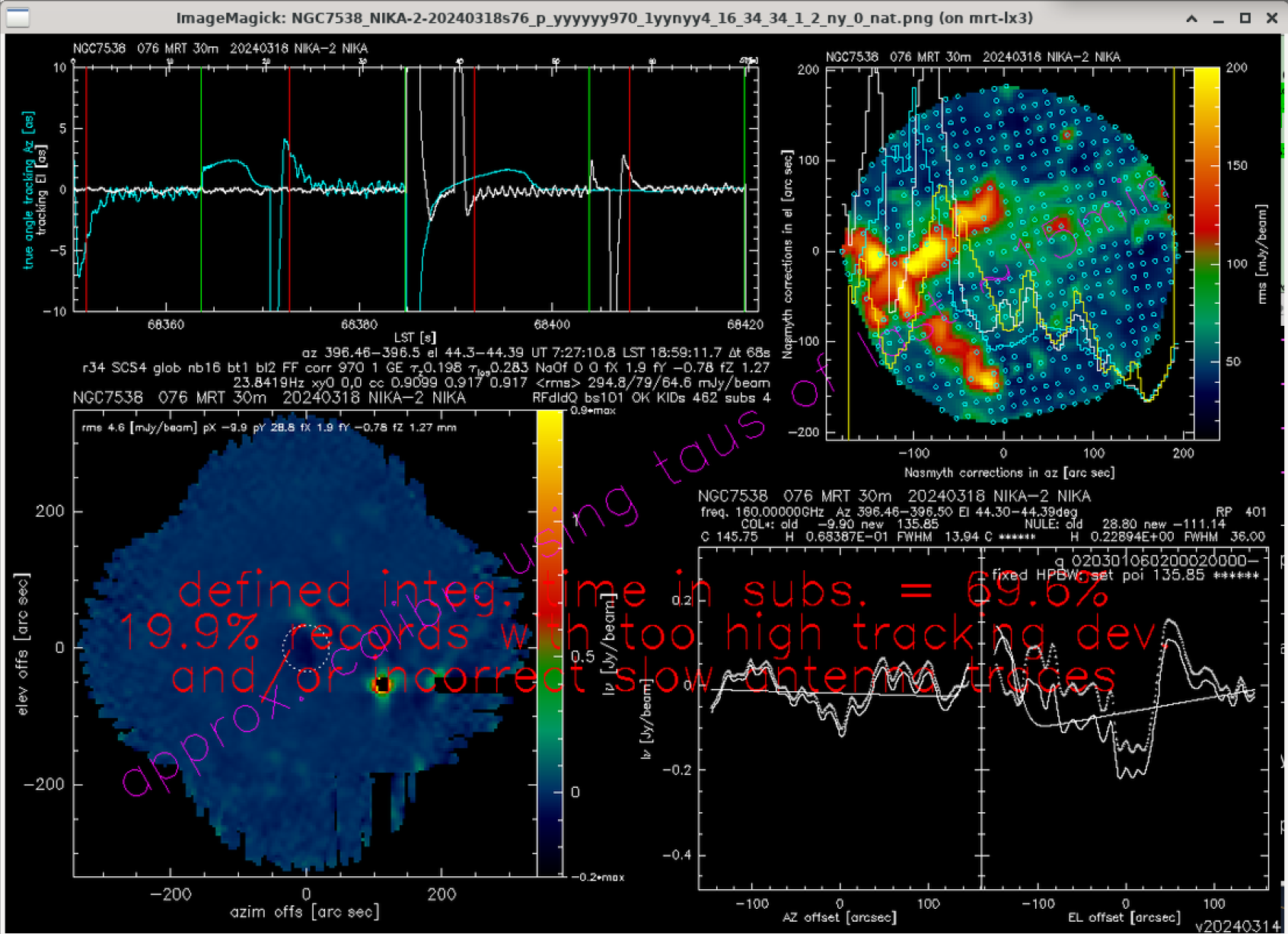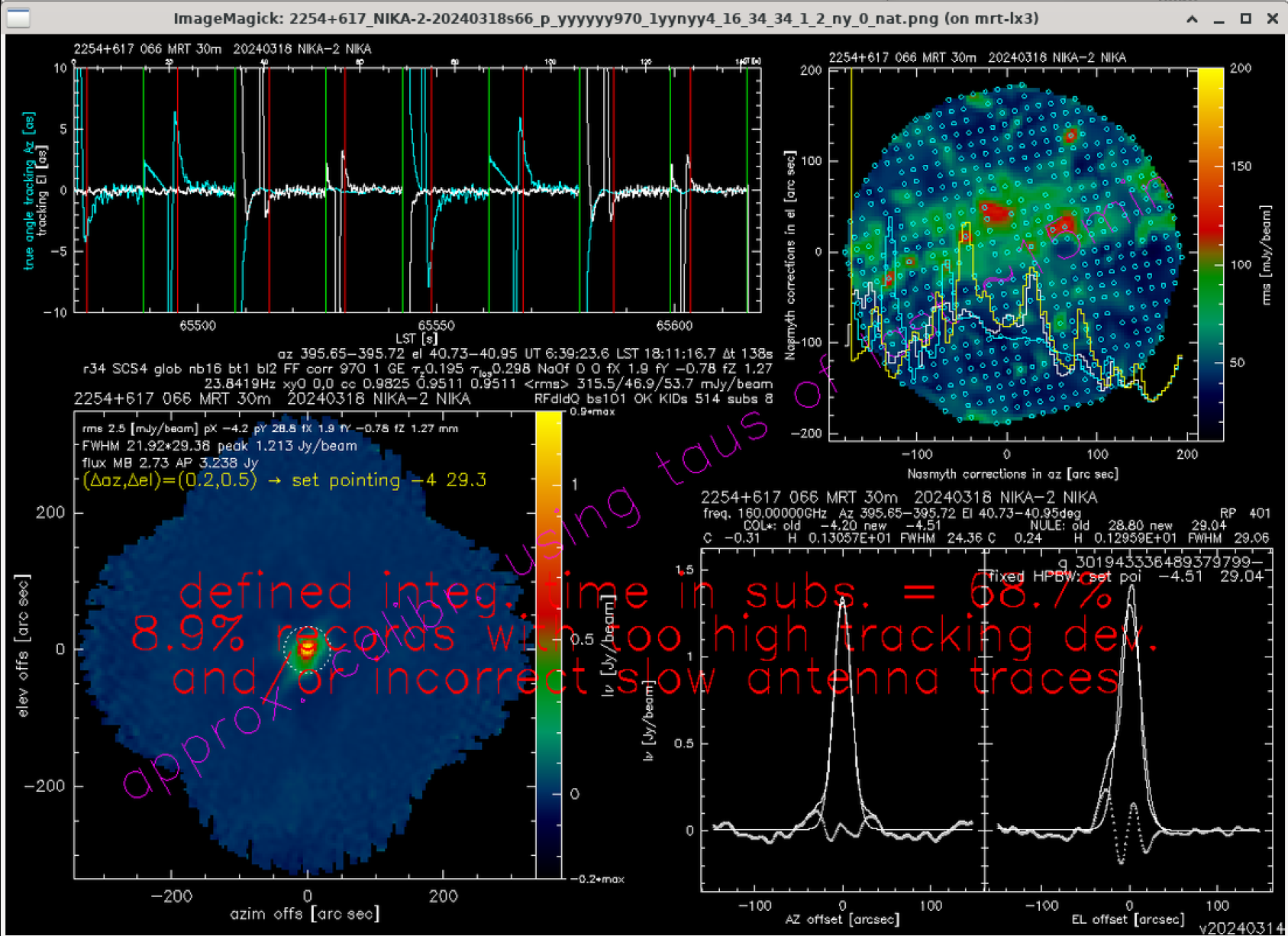Daily Reports
Contents
2024 Mar. 12th, Tuesday
Federico, Giovanni, Lea, Ste B. and Stergios at the telescope since ~10:30 (hereafter, local time), Quang in remote.
16:00-22:00; Stergios: maintenance finished around 16:00. We started with EMIR test observations with Ignacio testing the lateral focus at Uranus. The observations fail indicating a problem with ACU/spindles. The plan to perform lateral focus with NIKA2 around midnight is cancelled. At 17:12 we switch to NIKA and performed the DAQ with final values of bad pixels of 16/1/49 for the Ar1,2 and 3, respectively. KIDS are tuned properly, imbfits are created with the delay we observed the past weeks. We continued with calibration observations and moved to project 117-23 (orion) performing the 5th and 6th map repetitions. After sunset we moved to Uranus again for pointing, focus, calib_1scan, beam map and skydip (check the screenshot below for a weird skydip result from PIIC). Beam map was performed at ~40 deg of elevation, not optimal but we agreed to take more maps during the night. We performed another DAQ at 21:20 with 16/1/37 bad pixels for the Ar1,2 and 3, respectively. We continued with the project 138-23 that requires 3 hours to finalize. Another DAQ performed shortly after due to weird KID behavior (new bad pixels count: 31/3/38). At 21:42 we started the observations of NGC4214. Stefano and Lea take over.
A shy Moon and Jupiter set on Granada
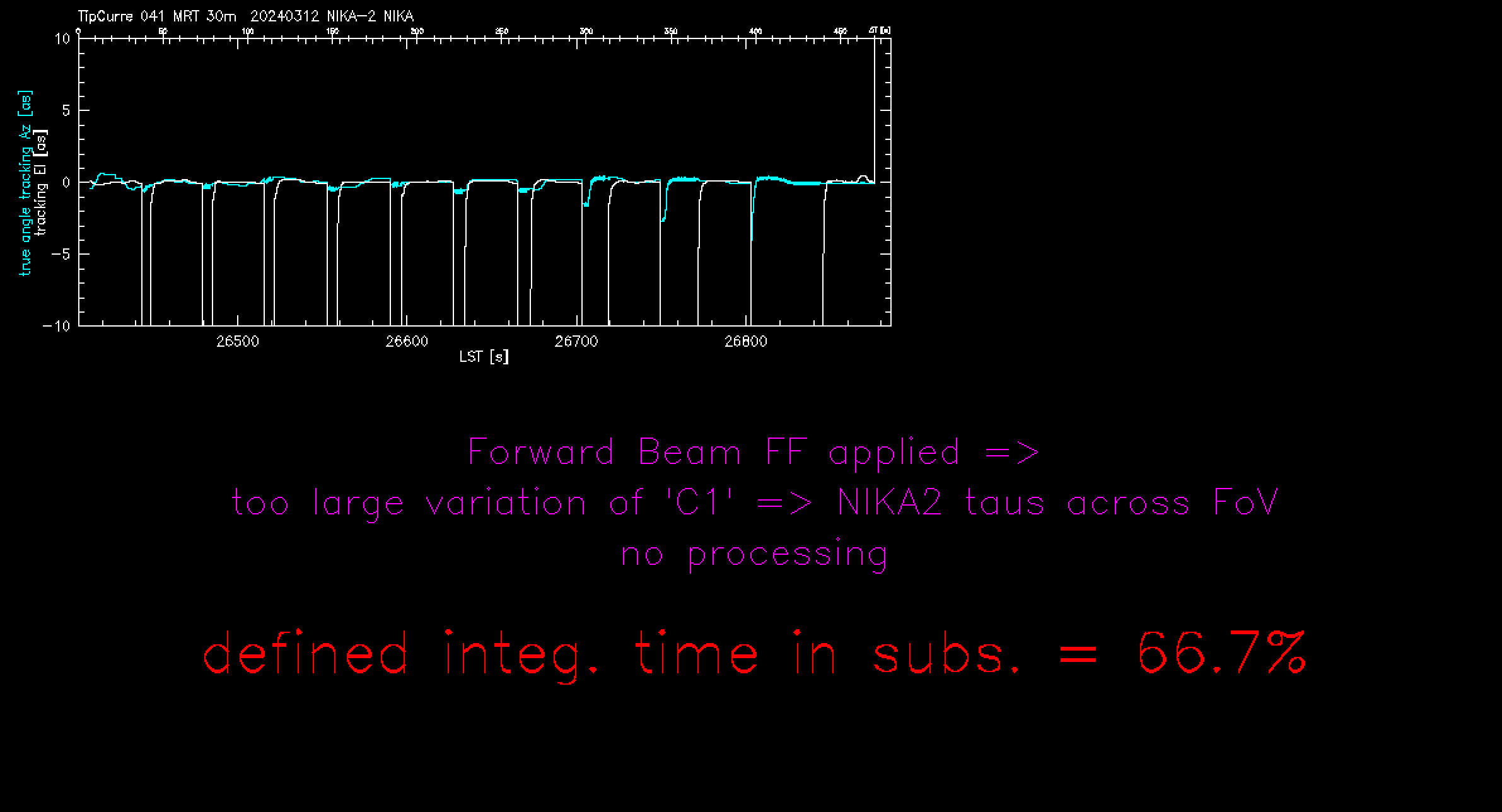
It's a beautiful day on Pico Veleta
22:00-06:00; Stefano/Lea:
We take over at 21 UT as planned, and we continue observing project 138-23.
At 21:50 UT, we test the custom make-imbf, designed to run several instances of make-imbf in parallel. Bilal has kindly pointed SB to these scripts. We have edited them to adapt them to cryo run 78, but it's not been enough: it does not seem to start properly. Probably more editing might be needed. Therefore we switch back to the standard make-imbf, to avoid wasting time. Total amount of time lost: 10 minutes. Later we noticed that we might have been too impatient and maybe the custom make-imbf actually really started its job, but SB decided to kill it too early. We might try again later during calibrations or tomorrow.
During the whole night, we observe:
- 8 repetitions of NGC4214 for project 138-23 (2h in total)
2 repetitions of A2623 for project 153-23 (>~1h in total)
- beam-map on 1226+023 (scan 20240313s26), option "a". Followed by a skydip.
4 repetitions of NGC4214 for project 138-23 (1h in total) -> target completed! (total 13.2h)
- 1 repetition of A2747 for project 153-23
@4:45 UT we have to park the telescope because wind gusts reached 21 m/s
2024 Mar. 13th, Wednesday
06:00-12:00; Quang, Stergios: Around 6:00 we parked the antenna due to high wind (gusts of up to 20m/s).Started the DAQ around 7:00 (bad KIDS 28/3/41). We lost a couple of times the access to the remote screens. Wind increased again until 9:00 where the wind dropped significantly. DAQ shows 18/2/36 bad pixels. The issue with the screens persists (PM was contacted and fixed the problem). IR checked the Sun avoidance and it worked however the cost was to heat the antenna. We started finally the observations at 9:42 using Mars as calibrator and observing project 151-23 until the end of the shift. No polarimetry observations were performed.
12:00-14:00; Federico: Found problem in the current position of the telescope with respect to the source position in XEPHEM for the ongoing observation of PSZ2G066, project 151. The telescope is not pointing on the source! We restart XEPHEM, problem remains. We cancel the current observation (3 scans in tapas, ids: 63 to 65) and did a test pointing in nikaw account on a nearby source (1800+440). The problem persists: the position of the telescope in XEPHEM and in the operator monitors does not coincide with the location of the source in XEPHEM, but we have the source at the centre of the FOV. In the meantime we check the problem with experts, we tried again with observations of PSZ2G066 (in the 151-23 account), but the problem persist (and we cancelled the observation queue, test done ids: 66, 68,69,70,71). A missing "0" in the dec value (i.e. 40:08:7.400 instead of 40:08:07.400) of the source was the origin of the wrong telescope position. We test again, sending another observation of the source, and now the telescope move to the correct position. However, due to the project limitation in elevation and tau, we do not continue the observation. All these tests done in 151-23 account. In nikaw account, started calibration session on MWC349. done pointing and two focus, then a pointing. After that, lauched a calib_1scan.
14:00-22:00; Stefano, Stergios, Giovanni: calib1scan on CRL2688 and NGC7027. Then SkyDip. First repetition on CLJ153 for project 143-23. Tau~0.3-0.4. Beam is a bit elliptical (17x19’’) but less than 21’’ required by the PI so we continue. Tau still stable at ~0.3-0.4. We calibrate pointing and keep using NIKA. Second repetition on CLJ153. Finished at 17:30. Tau increasing to ~0.4. Source <30deg. We stop observing this project.
When the sky becomes too bad for NIKA2, before switching to EMIR, we perform few tests, as decided during today's NIKA2 meeting:
- we trigger a long slew on purpose, with a "track" command, with the aim to check if the make-imbf skips the "track" or not. The scan is 20240313s122. The make-imbf produces an empty imbf file, without wasting time on the long "track" slew. This is the standard make-imbf. A pointing follows (scan 123) and the imbf is produced promptly. Thank you, Albrecht!
- we switch to the custom make-imbf mentioned and briefly tested last night. This time we aim at testing it more thoroughly. We therefore start a very long scan (scan 124), used previously during the January NIKA2 week for the telescope commissioning, followed by a pointing (scan 125), followed by two long scans and then yet another pointing. If this works, the long scan (big imbf file) will not delay the creation of the pointing imbf. The custom make-imb prepares a imbfits file of the big map, but it stays empty. Same story for the pointing. Therefore we interrupt the test here, without observing the two next big maps. My feeling is that since 2020-2021 the make-imb has evolved (at least because of the changes coming with the new ACU and Blue Pill), therefore this custom version - that was designed on an older make-imb - does not work now. I might be wrong and it might only needs some basic editing, but I don't know how to check this. I'll contact Bilal again and I'll also talk with Jean about it.
- we test the lateral focus script for NIKA2. The weather is not good enough to perform the lateral focus, but we would like to test if the script is working properly, so to be ready when the sky permits. We would also see if PIIC does process the XY focus sequence(s). Today Jean and Ignazio have fixed a problem in the Blue Pill, that was preventing the sub-reflector to move in X-Y, when commanded to do so. Now we run a pointing (scan 127), followed by Z focus (scans 128-132), X and Y focus script (sequence of 7 scans each: 133-139 and 140-146). Result: the scripts work, the sub-reflector moves in X-Y. PIIC does not process the data and gives the message (scan 133): "24.7% records with too high tracking and/or incorrect slow antenna traces" and "corrupted file and/or synchro problem, or ...". The tracking in Az looks terrible on the PIIC plot. The wind is low, though. The PIIC QL processing of the next N scans does not even start: "fatal, no EXPTIME in header". We stop the QL an start it again. Nothing changes. PIIC process scans 133 and 140, i.e. the first ones of each focus X-Y sequence, but not the others. Closing the QL and restarting it lets it load scan 141, but it gives the same result as for 133 and 140.
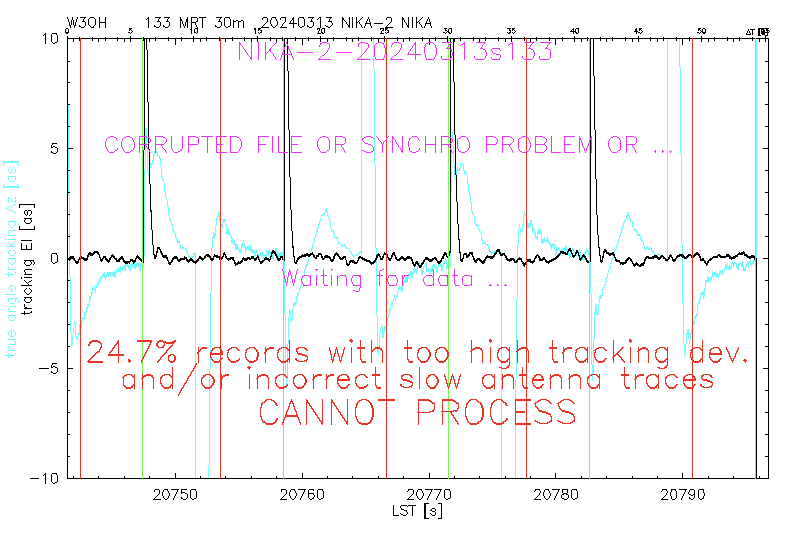
scan 133: PIIC cannot process...
Switching to EMIR around 20:00. IR performed some lateral focus tests with EMIR. Started observations with EMIR at 20 UT. Setup project 83-23. IF switch box not working: we can’t select the right observing mode for EMIR. Operator goes up and down the antenna. After fixing this, we can’t tune the receiver a the desired line.End of shift. We didn’t start to observe yet.
22:00-07:00; Stefano/Lea: we take over with EMIR. Our shift today will be 22:00-00:00 and 04:00-06:00, with in between remote EMIR Polami observers for 087-21.
The first stint (22:00-00:00 local time) is spent trying to tune EMIR, which does not seem to be willing to collaborate. Then the Polami team observes in remote from 00:00 to 04:00 (local time) At 4:00 we are back. The sky is very unstable and tau(225) oscillates frantically between 0.4 and >0.7. We keep observing with EMIR. We start project 124-22 (P.I. W. Kim) and after tuning, pointing, focus, we observe 1 repetition of G31.41+0.3 (total time: 1 hour). At the end of the shift @04:55 UT, we start a second repetition that will take another hour in the next shift. Good night (morning)!
2024 Mar. 14th, Thursday
07:00-12:00; Quang: No observations due to an EMIR issue (switch box). Weather not good enough to switch to NIKA. High wind conditions starting around 9:00 (local time).
12:00-14:00; Federico: Conditions not suitable for observations. High wind speed (around 15m/s, with peaks at 20m/s), tau~0.4 and not stable.
14:00-22:00; Giovanni: 4:00 EMIR observations. We start with project 104-23, source 1757-240 with E090. Atmosphere is unstable, tau ~0.4. We go to NGC7027, but the telescope slews in a wrong direction and almost crosses the sun. Vertex did not close automatically, it was closed by the operator. Restarted PAKO. We do pointing and focus on NGC7027. Atmosphere is unstable. We focus and then do pointing calibration. Very strong atmospheric fluctuations, we can’t get reliable pointing offsets. 14:50 Slew to W3OH which is higher above the horizon, also very close to the source of the project. Still very bad pointing results. 15:50 another pointing. Very bad result. 16:20 we are inside a cloud. Trying again in ~30m. 17:00 tau~0.4 although the sky is completely covered by clouds. Is the tau-meter working correctly? 19:00 tau dropping fast. Starting nika observations. Pointing and focus on Uranus, then on AlfOri which is close to orion B. Calib1scan on AlfOri, forgot to do on Uranus. Good stability (1-2 Jy p2p). run 3 script on project 117-23 (Orion ![]() with tau around 0.2 and decreasing. 1 repetition on orionb-1. 1 repetition on orionb-2. 1 repetition on orionb-3. End of shift.
with tau around 0.2 and decreasing. 1 repetition on orionb-1. 1 repetition on orionb-2. 1 repetition on orionb-3. End of shift.
Bonus: a nice picture of the telescope scanning Orion:
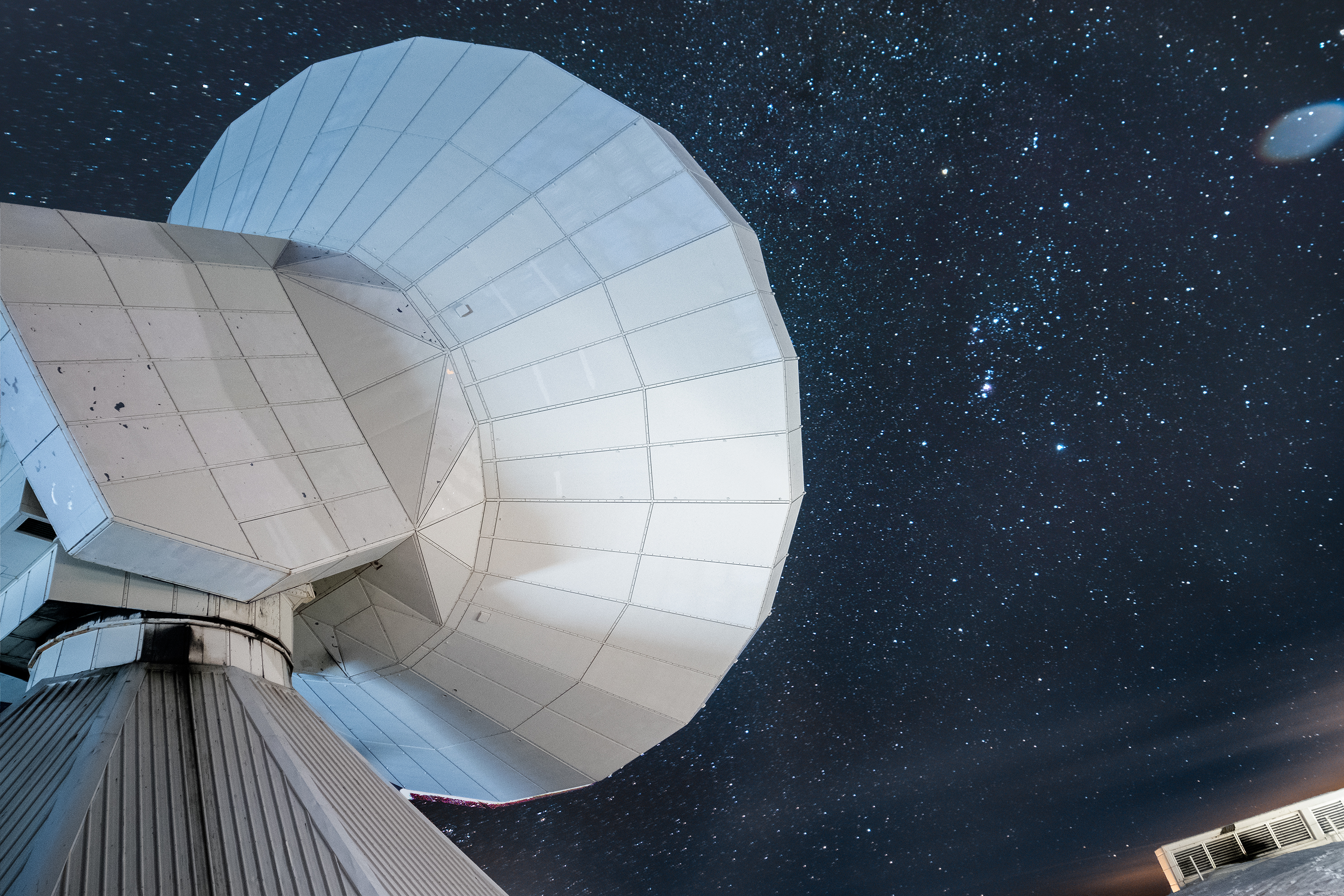
22:00-06:00; Stefano/Lea:
A young fox says goodnight to the sun
It's going to be a great night...
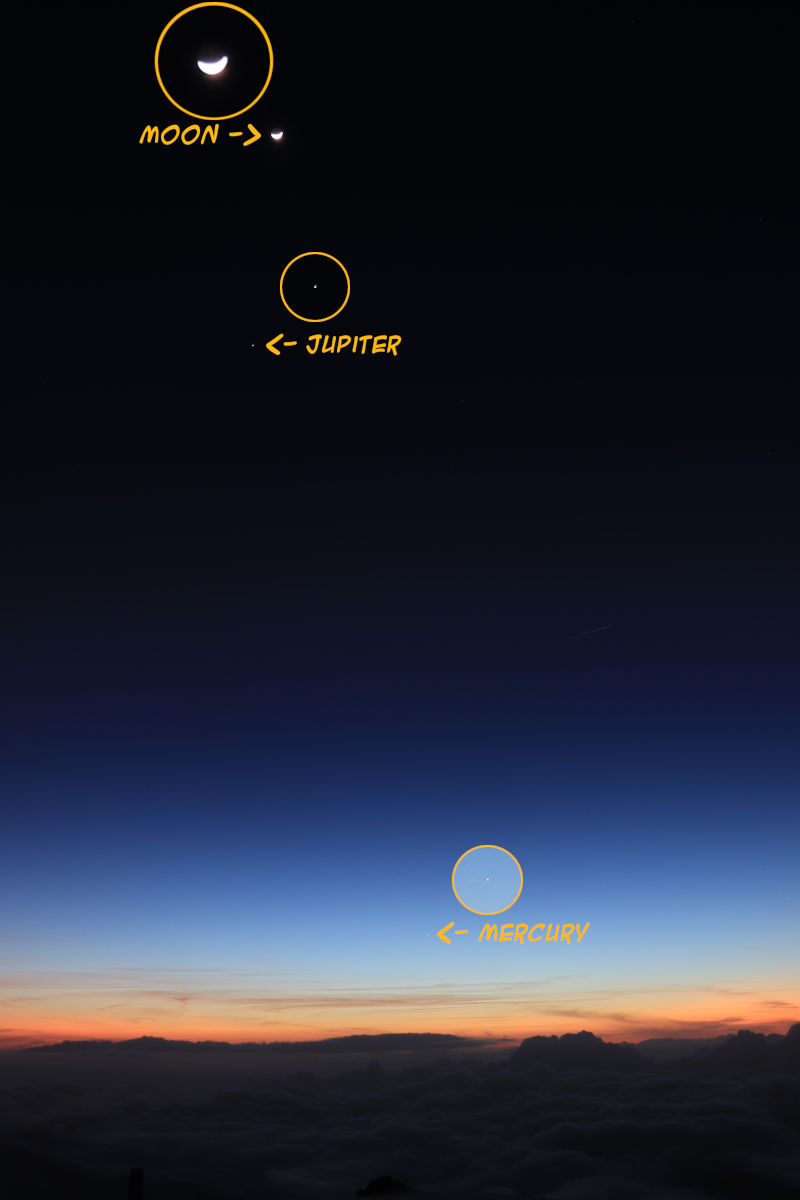
We take over at 21 UT. The sky is great. tau(225)~0.15. We observe the whole night with very good and stable conditions:
- we let the scan of 117-23 finish (orionb-3 repetition 2/9)
- long make-imbf wait but we run the make-imbf extra by hand on the pointing that follows them, so to avoid wasting precious time, WOW, it works!!! So cool! SB is impressed. Very stable beam.
- 150-23 one repetitions of source "id321" (tot ~1.5 hours, but checking the time it seems much longer)
- beam map on 1226+023 with option "a", starting at El=48 deg (scan nr. 20240314s126)
- 153-23 five repetitions of source AR2623 (tot ~2.5 hours)
- 153-23 two repetitions of source AR2747 (tot ~1 hour)
A space-time portal opened on our heads tonight... and these popped out... what are they?
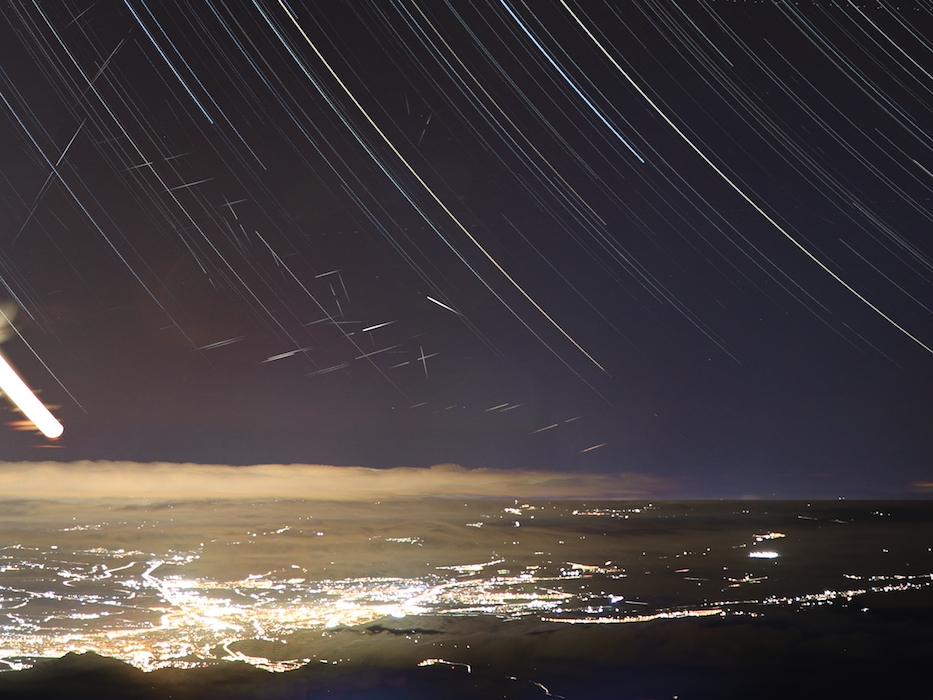
2024 Mar. 15th, Friday
06:00-14:00; Federico: Continuation of 12th repetition on AR2747, project 153-23. After that, final pointing on 1354+195. Found problem with spindel (originated at 3:43h UT), not tracking properly! Solved and checked pointing in nikaw account on some sources. Then, pointing and focus on K3-50A and calib_1scan on MWC349 (scan 66), NGC7027 (S67), and CRL2688 (S68). Changed to project 106-23, pointing on K3-50A for pointing and then observation of 19489+3030. The source becomes too high to do a second Repetition, moved to project 151-23. Pointing on 1732+389, and then done 2 repetition on PSZ2G066. Final pointing on 1732+382, then a skydip and focus on K3-50A. Changed project to 106, compleated the two remaining repetition on 19489+3030. A synchronization problem error message appear in the monitor display of array2 for the first scan (S106) of the third repetition. Pointing then to 2013+370 and then completed observation of 20243+3853. Moved to Uranus for pointing and focus
14:00-22:00; Stefano, Stergios, Giovanni, Federico: after the explanations by Robert, we understand what was wrong in March 13th lateral tests focus, so that PIIC could not process them: a) the header keyword describing the focus had a non-compliant value; b) the tracking deviations, very large, made PIIC reject more than 20% of the records. We find the solution to both: a) we modify the PaKo scripts changing the "comment" value (this is what will go in the header of the imbf!); b) we modify the PaKo script making the subscans much longer (10 arcmin now), such that the percenteage of rejected records becomes smaller.
At ~19:15 UT we test the new focus-X and -Y scripts. Now PIIC monitor processes the maps like a charm, but it was designed for focus sequences of 5 (five) maps, and the new focus-X and -Y have 7 (seven) scans each. Robert has also provided some modified PIIC QL scripts, Stefano will continue working on this after dinner.
22:00-06:00; Stefano/Lea: we take over and we continnue the observations of 150-23 started few minutes before the change of shift.
Meanwhile, Stefano tests the scripts kindly provided by Robert for the lateral focus. It is basically a custom version of PIIC QL, specific for this purpose. It works well, thank you Robert! The only caveat is that if any map of the sequence of seven is rejected (e.g. because the big tracking deviations affect more than 20% of the records), the focus sequence needs to be repeated. This happened with the focus-X test that we performed before dinner (there was a mistake in the script, i.e. I did not change the size of the map for the first scan of the sequence, sigh). More will come around midnight.
Tonight we observe:
- 150-23: one repetition of id321 (1,5 hours)
- lateral X,Y focus session on 1226+023 (Stefano, Stergios, Lea): pointing, focus-Z, pointing, focus-Y, pointing, focus-X, pointing, focus-Z, pointing, focus-Y, pointing, focus-X, pointing, focus-Z, pointing.
- started at 23:00 UT, ended at 2:24 UT
- best focus-Y offset = -0.78 mm
- best focus-X offset = +1.90 mm
- consequently focus-Z offset = 1.55 mm [2:15 UT, Az=208.6 deg, El=51.5 deg, T(outside)=+1 C]
- consequently pointing offsets = -5.3 37.5 arcsec (very large! need new pointing session?!) [Az=210 deg, El=51 deg]
- sidelobes max 5.8% at the best (final for now) XYZ focus position
- the modified scripts prepared by Robert work very well. Thank you, Robert!
- I think we can consider ourselves satisfied for tonight
- beam map on 1226+023 (scan nr 20240316s38)
- 153-23 two repetitions of AR2623 (1 hour)
- 153-23 two repetitions of AR2747 (1 hour)
2024 Mar. 16th, Saturday
06:00-14:00; Federico: Continuation of previous observation of AR2747 sent in the previous session (14th repetition). Done pointing on nearby source (1354+195), good beam, so sent another repetition (15th on AR2747) before the conditions for observation become worst (e.g. el <35 and tau>0.24). Then move to MWC349 for pointing, focus, and calib_1scan on MWC349 (scan 81), NGC7027 (S82), and CRL2688 (S85). Moved the telescope far from the sun and near the next science target, but first done a Skydip (scan88). Then moved to project 151-23, target PSZ2G066, Pointing done on 1732+382. Cancelled observation, after the first over 4 scan. Inconsistent elevation coordinate on TAPAS for the previous pointing (scan 92). The fisrt scan of PSZ2G066 seems fine, but moved to nikaw account to check if the problem persist. Done test pointing on 1641+399 (scan 94). On Antenna data stream: az=286.605, el=51.934, on tapas: Az=286.72 el=66.73. Done other test doing tracks, the problem persist even after restarting Pako. Temporary fix: do first a track, so it would have the wrong coordinates, and then the actual observation. Due to the lack of other possible sources to observe in this time slot, we continue observation of PSZ2G066. Observation started within the limit in the README file, but it will end below el 50 and with higher tau (now ~0.3, condition in the README: el>50, tau<0.3). For all the scans (from 116 to 119), PIIC was not able to produce QL (always shows synchronization problem errors on all the array monitors). Check with PIs if the observation (3rd repetition over 4) is ok after offline reduction. Recalibration of Nika, bad kids:31/2/32. After, pointing and focus on 0316+413. Calib_1scan on Uranus (scan 138), then skydip (s139), focus again on CLR618 (it's hot today and we moved near the sun to reach this part of the sky) and calib_1scan (s148). All the previous focuses reports lower sidelobes than the past days (,9-10% at 12-13pm!). Condition suitable for project 149 (el>30, tau~0.3). Starting observation of CLJ153. First pointing on Uranus (no nearby strong point source, other close to the sun).
14:00-22:00; Giovanni: 14:00 2 pointings on 0135-247. It's close to the sun. Beam is reasonable: 18.39 18.77. 14:15 start observing CLJ153, repetition 4/30. Tau~0.31 and stable. 14:40 Tau~0.78 spikes during s158 and s159. 15:20 end of repetition 4/30. Interrupting observations for ~30m and see how tau goes. 15:45 Pointing on uranus reasonable, but tau is now 0.4. 15:50 we switch to EMIR. 16:10 pointing, focusing, another pointing on Uranus. Focus is perfect. Pointing good, beam is symmetric. We do another pointing with E230 to check the beam. Some sidelobes visible in both AZ and EL. We switch back to E090. Switch to project 104-23. 17:30 Pointing on W3OH, then observe NGC7538, script 5, 1.5h. 19:15 end of script. 19:45 switch to project 083-23, point on Uranus. 19:55 starting to observe L1544, offset 0,0, repetition 1/6. 20:20 starting repetition 2/6, offset 0,0. We got two spikes with tau~2. 20:50 starting repetition 3/6, offset 0,0. 2 Pointings on 0316+413. Starting repetition 4/6. End of shift.
22:00-06:00; Stefano/Lea: we take over at 21:00 UT and it's EMIR time: we start with project 068-23 and observe two sources. We switch to NIKA2 at 00:10 UT. Lost KIDs:40, 5, 43. We observe:
- 1 rep of id321 for project 150/23
- beam monitoring using focus scans at El~27 deg and 70 deg (see below)
4 rep of AR_2747 for project 153 -> only 1.5 were complete (see morning shift)
The telescope got stuck few times during the afternoon/evening/night with the message "rate loop error active". Tonight it happened at scan 20230217s14.
Monitoring of sidelobes max percenteage:
focus scans 20240317s4-8 ; Az 165 ; El 46 ; sidelobes max 4.4% (best of the focus sequence)
focus scans 20240317s21-25 ; Az 250 ; El 27 ; sidelobes max 4.4% (best of the focus sequence)
focus scans 20240317s28-32 ; Az 80 ; El 72 ; sidelobes max 4.3% (best of the focus sequence)
It seems that we did a good job yesterday night, after all (lateral focus @ El=50 deg).
We celebrate the 4.4% sidelobes with the traditional NIKA2 Saturday night...
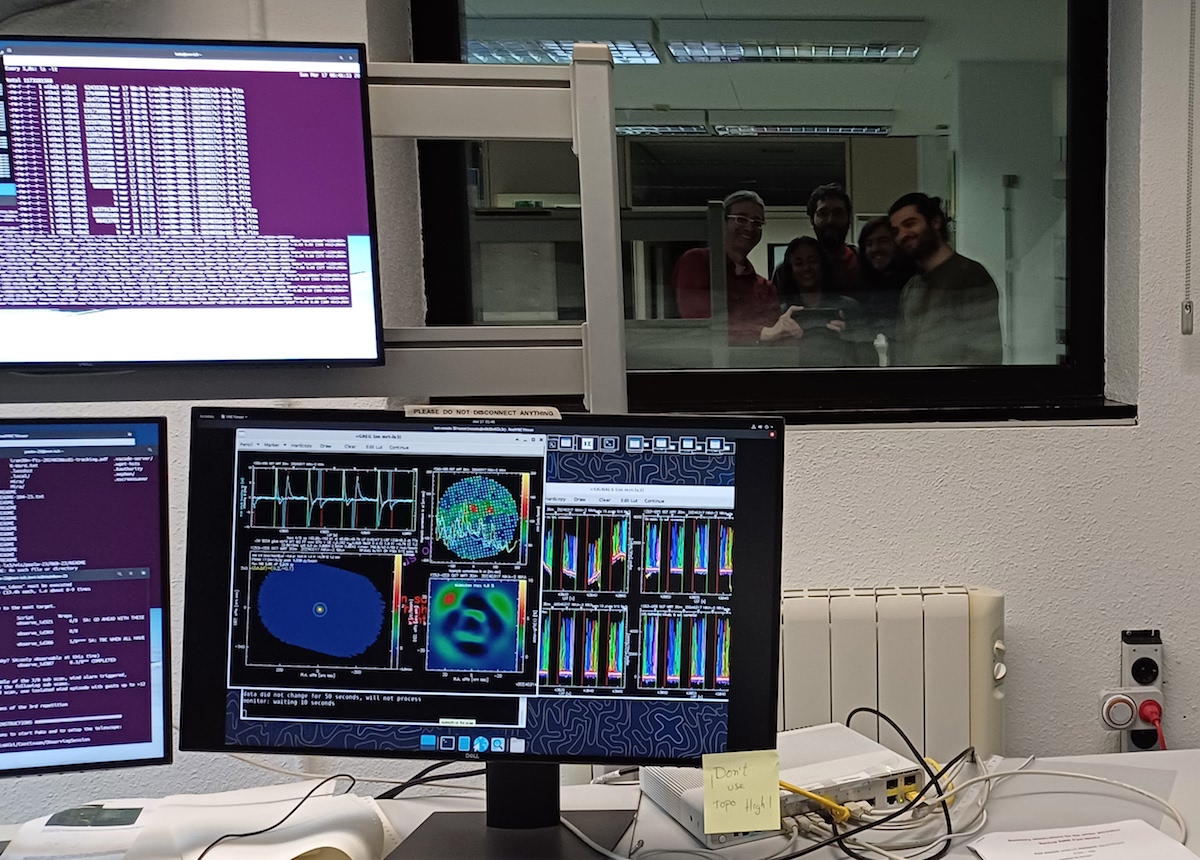

The summary of our week so far... and some space pollution.
2024 Mar. 17th, Sunday
06:00-14:00; Federico: Started with some problems. The creation of the imb.fits file was not working, last processed scan 38. Moreover, the data acquisition monitor for Nika was no more active. Cancelled current observation, reloaded imb.fits file creation script and started again the KIDS calibration. New bad Kids: 33/2/34. Restarted observation of AR2747, repetition 17th (from scan 50).It's more windy today. AR2747 reached an elevation of ~35deg, thus done a final pointing and then switch to project 106. Beam still good, no need to refocus now, so started observation of one target from low priority, to complete the assigned time (also, not so many target to observe now for other projects). Observed WB89-014 fully (all 3 repetitions). Moved to 1633+382 to focus. However, the wind speed increased, and all focus attempt and pointing failed with high tracking deviation. Observation interrupted (~10h am, LT), waiting for lower wind speed. Telescope moved at lower elevation (and opposite to the sun). Higher spikes in wind speed appear, telescope parked (11h:05am).
SB: this is what happened: the DAQ stopped working. Scans 39-46 are lost. Scans 47-48-49 were cancelled. Next good scan: nr 50. Of the 4 rep started on AR2747 in the night shift, only 1.5 were finally executed.
O 14:00-22:00; Giovanni: 14:00 Wind. 15:00 We try pointing on Uranus. Bad pixels 34/2/33. Pointing good. Tracking deviations +/-3". Set focus. calib1scan. 16:00 pointing on calibrator near CLJ153. First good. After switching project, the pointing does not start (stuck on "loaded"), AZ is stuck. Re-tune at 16:20. 35/2/39. 16:30 pointing works again. 16:40 AZ stuck again. Starting repetition 5/30 on CLJ153. Stuck during observation. 17:00 restarting repetition 5/30 on CLJ153. 18:15 finished. Slewing to Uranus. Pointing stable (2 repetitions). Beam 18x20, we focus first around 0.9, then around 1.5. 18:45 Set focus 1.58. Beam 17.37 x 18.12, max sidelobes 4.9% at AZ 244 EL 55.8. Calib1scan. Slew to AlfOri. Pointing, calib1scan. 19:30 starting repetition 2/9 with script observe-orionb-4. 20:00 starting repetition 2/9 with script observe-orionb-5. 20:40 skydip. 20:55 stuck again, s139. s140 worked. Point&focus on 0316+413. calib1scan on CRL618. Point on 1039+811. 22:00 start observing id386, repetition 6/8.
The following brown blinking behavior have been observed for a couple of hours (screenshot at 15:44 UTC, scan 105):
22:00-06:00; Stefano/Lea: we take over at the designated time. We observe:
- 150-23: 2 reps of id386 (total 3 hours)
- 153-23: 0.2 rep of AR2747. Started one rep, but interrupted (see next item)
- problem with spindles at 00:50 UT. Scan 10 OK; scan 11 maybe affected (but PIIC QL result looks ok). Scan 12 cancelled. Elevation ~72 deg, scan speed 50 arcsec/s.
- 153-23: 1 rep on AR2623
- beam map on 1226+023 (scan 20240318s26)
- 153-23: 4 reps on AR2747; four scans lost because of spindles problems
- problems with spindles @3:20 UT (El ~70 deg) and @4:35 UT (El ~56 deg)
- tau-meter off @4:40 UT. Some alarm would help.
150-23 final status as of today: id307 with 8/3 reps; id321 with 7/8 reps; id386 with 7/8 reps
153-23 final status: we reached >100% of the allocated time -> Project completed! Yeah!
2024 Mar. 18th, Monday
06:00-14:00; Federico: Continuation of observation on AR2747 (20th repetition, last half). After that, calibrations on MWC349 (scan 60), NGC7027 (scan 61), CRL2688 (scan 62). Changed project to 106-23. WB89-002 still too close to the topology low limit at the moment (~8h LT, Az~56). Changed plan, skydip first (scan 71), then observation of another source, WB89-152. pointing on a calibrator source (NGC7538), due to the lack of other bright source (there is 2254+617 but seems not so point like). Calibrator source out of pointing, while 2254+617 is ok! Problem in the coordinates? Let's wait for this project, moved to 151-23, done last repetition (4th) on PSZ2G066. It's becoming more cloudy, but stable tau. Moved to another source of this project, PSZ2G046, from the lower priority list. 1st repetition with sinchronization problems in the QL after the first scan. The tau measurement are stable around 0.25. Sent another repetition for PSZ2G046 (thus 2/12 repetition done), even if the limit for this tau range are el>45 (now 40, will end at ~30 but tau stable at the moment). Again, some scan with synchronization problem. Moved now to 106-23, target WB89-440. Synchronization problem with starting pointing. Changed to nikaw-23 account for more test. Unable to do proper pointing and focus. PIIC QL return synchronization problem errors. Test session for high tracking deviation started (~12:40 LT).
14:00-22:00; Giovanni, Stergios: Alexei finished his tests around 15:00 LT and we observe the following effect performing a focus test with NIKA: -before Alexei's test:
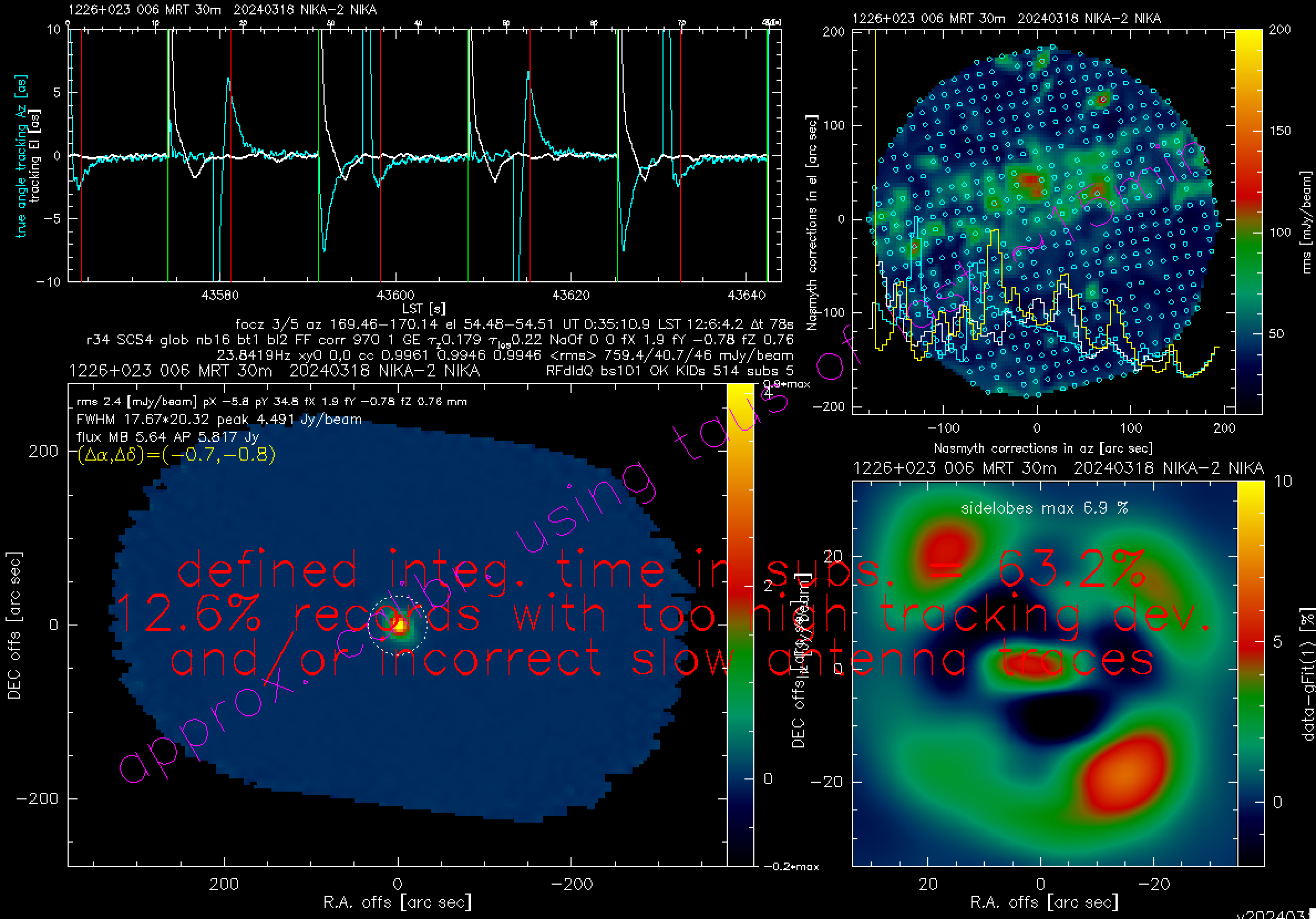
-after Alexei's test:
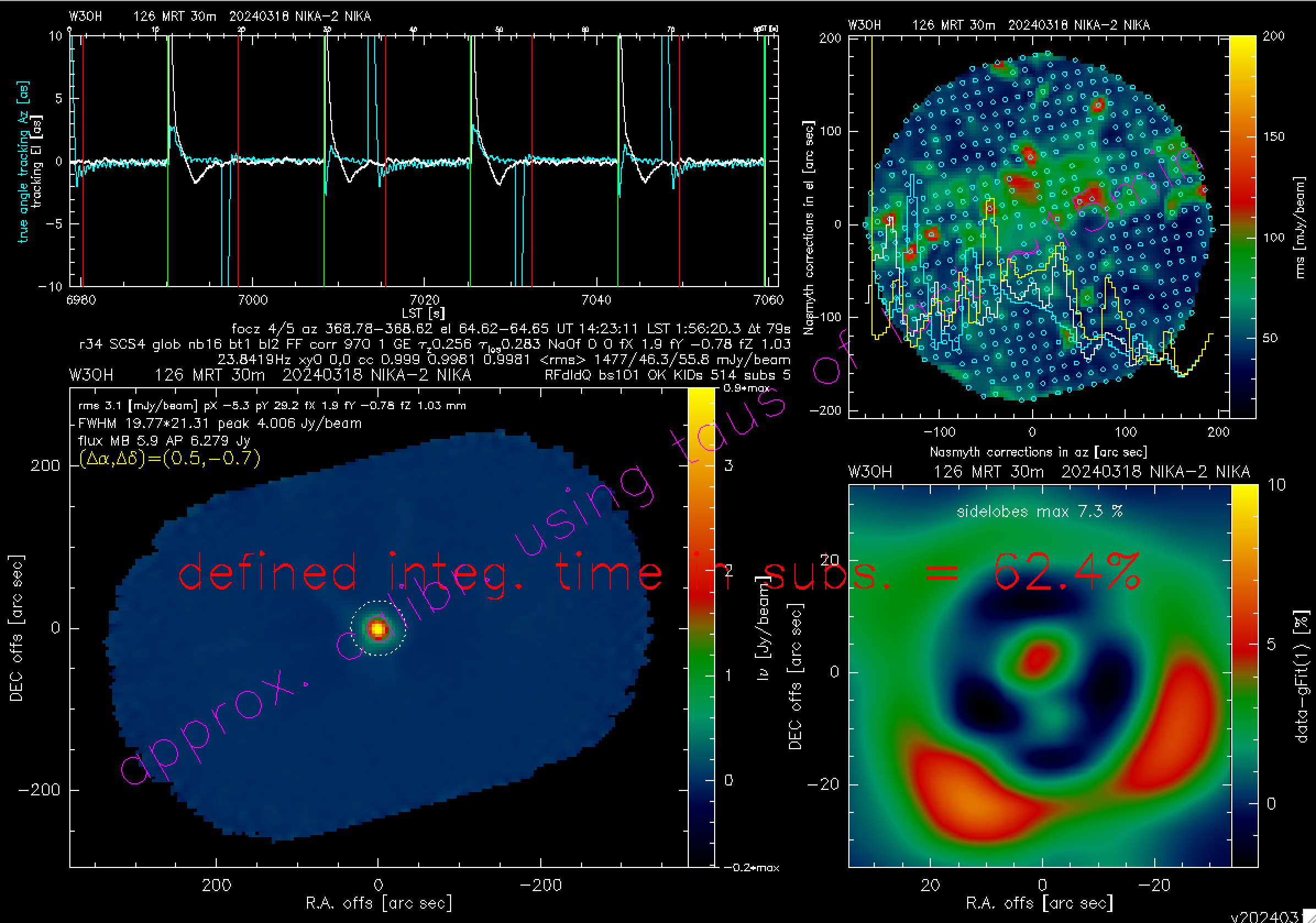
Stefano: it seems that the new intervention by Alexej has improved the situation. Here follow my considerations:
- remember that two seconds were added in January, after the "back on track" signal, in the attempt to contain the overshoot in the time spent between sub-scans. These extra 2s are still in use.
- now the overshoot is contained within these extra 2s
- nevertheless, we see a huge "jump" in Az after the telescope has reached the designated position: it gets there and then it jumps away completely off.
- this jump was seen also before Alexej's latest intervention, but after the jump there was an overshooting counter-jump. Before the intervention, the time off-track was longer than now. Now the jump is shorter, there's a very small counter-jump, but the jump itself seems stronger than before.
- in Elevation, the behaviour has a similar pattern as before this latest intervention: the telescope reaches the position and then overshoots. [CK: This may happen because the telescopes is moving too fast to decelerate directly to the commanded position.] But now the overshoot is smaller and its duration is shorter.
- if I may, in my humble opinion, the Azimuth behaviour is still not what it should be: the big jump away off track, after reaching the designated Az, should disappear completely. I think a small overshoot might be acceptable, but I do not understand the reason/meaning of these big jumps.
- is it possible to obtain in Azimuth a result similar to the one in Elevation? [CK: Is the big jump in Az caused by the telescope moving from one Az scan line to the next ? These focus scans were done in Az. It would be useful to compare with scans in El.]
15:00 Point on W3OH. First focus interrupted by operator, problem with AZ and/or hexapod. We repeat focus. Beam is elongated, ~18.5x21.6. The hexapod got stuck during the focusing. We repeat it again and check if it caused the elliptical beam. Pointing. Beam 18.4x21.6. 15:10 We proceed to project 106-23, source WB89-440, repetition 1/3.
NOTE: W3OH is not pointlike, i.e. does not show the beam Hexapod got stuck again during observation (s141-144), but on the right focus position. It should not have affected observations. Pointing on W3OH after unlocking the hexapod. "Beam" 18.66 x 20.83 as before, we did not lost focus (next time check the beam before unlocking the hexapod). 17:00 We restart observing project 106-23, source WB89-440, repetition 2/3. 17:30 Repetition 3/3. 16:30 Azimuth stuck after the first map. We stop observations.
22:00-05:30; Stefano/Lea: We take over at 22:30 UT, after the test of lateral focus with EMIR by Ignazio. It's EMIR time. We observe 2 sources for project 068-23 (1h each), followed by 3 reps. on 2 sources of project 143-23 (tot. 1h per source), and finally 124-22 two repetition of G31.
And also this pool week comes to an end, in the Rising sun. It's always wonderful to be here, see again old friends, meet new people, observe long nights, sometimes try to fix the "big toy", and enjoy the serenity of Pico Veleta. This season I was lucky enough to come here three times. A big thank you to all those I was with during these weeks, for your company, your friendship and your support. See you soon! Ste.
2024 Mar. 19th, Tuesday
05:30-10:30; Pablo Torne, Ignacio Ruiz, Sergio+Kike: VLBI tests. Started setup at 5:30am local time. EMIR 3mm setup OK but detected an issue with large different powers for the signals in H and V polarisation. About 2 hours investigating, delayed by problems with the IF switchbox selecting incorrect IFs sometimes, when in remote mode. Finally did the test optimising one polarisation (H) and leaving V with a low power. Tests carried out OK, cloudy but Tsys_3mm~100K. All VLBI scans recorded.
